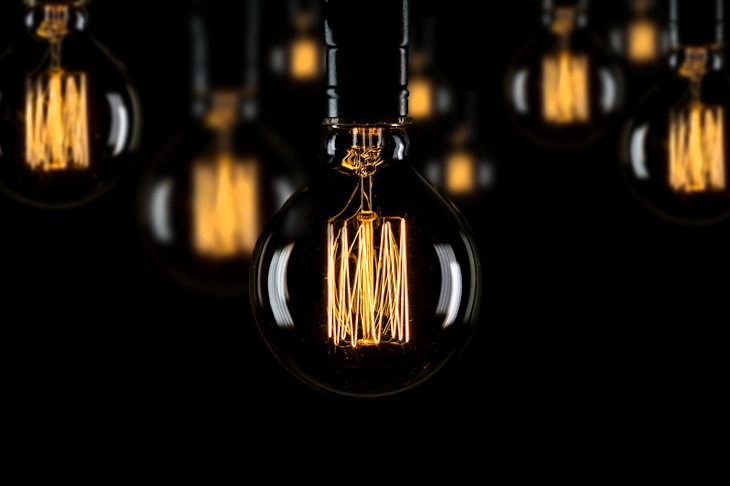Who’s afraid of the dark? Who now fears shadows and bumps in the night? Where do you even find any dark to be afraid of when your phone is only a pocket away? One swipe and the screen lights up blue-white like the old explorer’s match in a cave. If I wake in the night I don’t bother with the bedside lamp. A bar of light comes under the blinds. Lights from the flats opposite. Fire-escape lights from the hotel next door. The jaundice glow of London light pollution.
Even staying with my parents, on the edge of a village, there’s no real darkness. There are lights from the lane, lights from the next farm, lights from the main road on the hill. Intruder lights come on each time a muntjac makes for Mum’s vegetable garden in the small hours. Click. Click. Click. Lights on the lawn for a badger, a fox, a pheasant.
Inside, there are pilot lights on wifi routers, smoke alarms, burglar alarms, carbon monoxide detectors, laptops, televisions, phone chargers, electric toothbrushes and razors plugged in overnight. I can stumble to the kitchen for a glass of water without turning on a single switch: just follow the LED stars.
I have no gadget lights in my bedroom, but in hotels I can’t sleep until I have draped dressing gowns, towels, flannels over every last blinking light. I pile cushions in front of air-conditioners and unplug humidifiers. I am just back from Japan, where in Airbnb rentals red bat eyes stare from kettles, fridges, rice cookers, bathtub boilers. Every loo had its light-show shining through paper-screen doors. I never know what to do about ceiling fire alarms with on-again, off-again lights. I lie awake staring back at them in insomniac fury.
I’ve become obsessed with darkness. We talk about the ‘right to light’ in cities: the right not to have your windows and garden blocked out and overlooked. What about the ‘right to night’? To darkness undisturbed by security lights, undrawn curtains, phones left on all night. Friends seethe about partners leaving BlackBerries on the pillow, beaming messages from the office, from New York, from Sydney. Will our children think it quaint that we ever needed night lights as their own bedrooms are lit by the harsh glare of energy-efficient street lamps? Will we play babies to sleep with lullaby videos on iPads where cot mobiles used to hang? What future for gothic novels and horror films as it becomes inconceivable that the heroine wouldn’t just shine her iTorch on the deep forest and dank cellar?
When I was 13 and my brother 11 we were left alone while our parents went to dinner. We were staying in a house in the country, a place for creaks and hauntings. After they left there was a power cut. We borrowed Mum’s portable stereo and sat listening to audiobooks by the light of the LED screen. The battery symbol lost bar after bar. It started flashing. When it ran out, we would be in darkness. I was frightened; my brother thrilled.
The lights came on after ten. Blinding and reassuring. I still wonder, though, about what real darkness would have been. Would I have panicked? It might have been exciting to have been in that cold, old house in the dark.
Our ancestors faced down the dark. Our lights have made us less brave, less resilient, less imaginative and less prayerful. I can think of only two recent times I have experienced true darkness. Both had to be sought out. That’s the way things are going: we’ll pay just to try out the dark. The first was in Ramsgate Tunnels, where locals sheltered from bombs during the war. We walked far under the cliffs until the guide asked us to turn off our torches. He turned off his own. Darkness. Not a wink. Not a chink. But only for a minute before he turned his torch on.
The second was in an art installation by the American artist James Turrell. ‘Backside of the Moon’ is a black box into which you stagger with your hand on the shoulder of the person in front. You sit on a bench in complete, dizzying darkness. Far from being afraid, I found it peaceful. It blotted out worries more surely than any massage or meditation class. Turrell’s trick is that you aren’t really in darkness at all. The faintest neon tube is installed opposite the bench. It takes some time for your eyes to adjust. A sign outside had promised: ‘You will see the light.’
After ten minutes, I did. I saw the light and wished for longer in the dark.
Laura Freeman discusses the dark on the Spectator Podcast.
Got something to add? Join the discussion and comment below.
Get 10 issues for just $10
Subscribe to The Spectator Australia today for the next 10 magazine issues, plus full online access, for just $10.
You might disagree with half of it, but you’ll enjoy reading all of it. Try your first month for free, then just $2 a week for the remainder of your first year.














